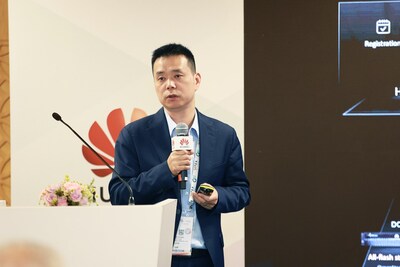Huawei has recently presented 17 products and 6 solutions at GITEX Global 2024, that relate to education, healthcare, manufacturing, and SMEs. One product, the IdeaHub K3, was developed to improve classroom engagement and interaction. For manufacturing, a newly designed factory network system helps businesses maintain flexible production with more efficiency.
An all-flash data centre was also announced to assist small and medium businesses with easier IT management. It will be bringing reliable infrastructure to prevent disruptions in their operations. Managed service providers received new tools to simplify operations and bring their services to more people in response to customer needs. These tools are expected to help MSPs manage growth smoothly.
How Is Huawei Strengthening Partnerships?
Huawei still prides itself in working together and partnering with other companies, having developed over 300 solutions to meet the needs of different industries. The eFly platform, for example, helps partners connect with enterprise customers, opening up new business opportunities. Through this ecosystem, Huawei supports partners who want to grow collectively.
On this, Peter Zhang, Director of the Commercial Business Dept at the Huawei Enterprise Sales Department, said, “Leveraging Huawei’s deep technical expertise in the ICT field and decades of experience in digital transformation, we have launched over 300 innovative products and scenario-based solutions for the commercial market. Through the HUAWEI eFly platform, we have digitally supported our partners in expanding their business with enterprise customers. It is Huawei’s partner policy in the commercial market to build a partner-centric and trustable ecosystem, so that partners can gain more benefits, incentives, and profits.”
At the event, Yusuf Ahmed, CEO of KEMS Zajil Telecom, explained how his company uses Huawei’s cloud technology to bring digital services in Kuwait. These tools help businesses become more agile and efficient. Richard Pearson from SIBCA in the UAE also discussed how Huawei supports green infrastructure development, and he shared plans to look into AI and data centre technologies with Huawei for smarter construction projects.
What Progress Has Huawei Made In The Middle East And North Africa?
Huawei’s public cloud business in the Middle East and North Africa has really grown over the past year. The company has grown and established its brand presence across industries such as finance, government, and media, supporting digital growth across the region.
In South Africa, Huawei introduced its cloud services in 2019 and became the first large-scale provider to have an availability zone in the country. With forecasts suggesting that the cloud market will grow from R35 billion to R113 billion by 2028, Huawei is positioned to continue growing and serving businesses with advanced digital tools.
How Is Huawei Promoting Hybrid Cloud Adoption?
At GITEX, Huawei presented its hybrid cloud solutions, which combine on-site and cloud systems to meet the needs of large organisations. These systems give businesses flexibility while maintaining control over their data. The goal is to become popular with government bodies and enterprises.
Huawei showcased how its hybrid cloud technology is helping industries such as public services, finance, and media improve how they work. The company works with partners to create solutions that meet the specific demands of these sectors. Hybrid cloud systems are helping organisations manage both local infrastructure and cloud platforms more efficiently for better service delivery.
There were over 6,500 exhibitors, 1,800 startups, and 1,200 investors attending, so GITEX 2024 was the perfect platform for Huawei to show the strength of its hybrid cloud solutions and build new connections across industries.



